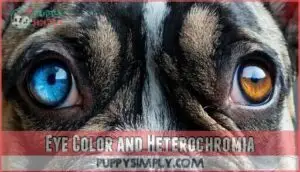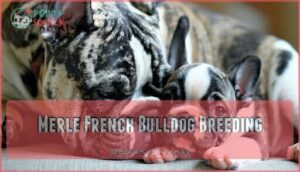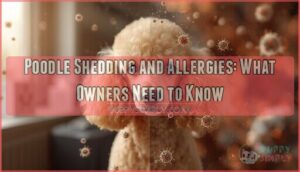This site is supported by our readers. We may earn a commission, at no cost to you, if you purchase through links.

This unique color comes from the merle gene, which creates their striking patterns but also carries health risks, especially if two merle parents are bred together (called double merles).
Like other Frenchies, they’re stocky little charmers, though they can face issues with breathing, joints, or hearing due to genetic quirks.
They’re lovable, loyal companions but need specialized care, including regular vet checkups.
If you’re considering one, understanding their needs—and finding responsible breeders—can save you and your future pup a world of trouble!
Table Of Contents
- Key Takeaways
- Merle French Bulldog Genetics
- Merle Coat Characteristics
- Merle French Bulldog Health
- Merle French Bulldog Costs
- Merle French Bulldog Appearance
- Merle French Bulldog Breeding
- Merle French Bulldog Care
- Merle French Bulldog Purchase
- Frequently Asked Questions (FAQs)
- Is Merle a French Bulldog?
- Are Merle French Bulldogs AKC approved?
- Can a Merle French Bulldog compete with a Frenchie?
- How much does a Merle French Bulldog cost?
- Why are Merle French Bulldogs controversial?
- Are Merle French Bulldogs prone to joint problems?
- How much is a merle French Bulldog?
- How rare is a merle French Bulldog?
- Can Frenchies naturally be merle?
- Can a merle French Bulldog be registered?
- Conclusion
Key Takeaways
- You’ll find merle French Bulldogs stunning with their unique marbled coats and blue or mismatched eyes, but their special genes can come with serious health risks.
- Avoid buying from unethical breeders; responsible breeding practices ensure better health and avoid risks like blindness or deafness in double merle puppies.
- Caring for these dogs means being vigilant about their genetic issues, including breathing, joint, and genetic issues, with regular vet checkups and proper grooming.
- These rare pups are expensive, costing between $6,000 and $15,000, so be prepared for substantial upfront and ongoing expenses.
Merle French Bulldog Genetics
The genetics behind a Merle French Bulldog’s unique coat involve a semi-dominant gene that affects pigmentation.
Understanding this gene helps you avoid risks like health issues in double merles and guarantees responsible breeding practices.
Merle Gene and Inheritance
In canine genetics, the merle gene bulldog pattern comes from the M-locus gene, creating unique coat variations.
A single merle parent contributes the gene, producing a mix of merle and non-merle puppies.
Watch for "cryptic" or "phantom" merles—dogs carrying the gene without visible traits.
Genetic testing guarantees healthy breeding and prevents accidental merle inheritance surprises.
Double Merle Breeding Risks
When two merle dogs are bred, the double merle gene substantially increases the risk of genetic disorders.
Breeding two merles drastically heightens genetic risks, leading to potential blindness, deafness, and lifelong health challenges for puppies.
Puppies may face blindness or deafness due to irregular melanin distribution, leading to severe health issues.
Responsible breeding avoids these pairings to prevent ethical implications and suffering.
Genetic counseling guarantees healthy choices, prioritizing the dog’s well-being over rare coat patterns or appearances, ensuring healthy choices.
Merle Genotypes and Coat Patterns
Ever wondered what makes that merle French bulldog’s coat so striking? It’s all in the M allele.
The merle gene creates amazing color variations, from mottled patterns to rare phantom merles.
Genotypes like Mm express vibrant coat patterns, while genetic testing guarantees healthy breeding.
Each dog’s unique pattern expression highlights its genetic story, adding charm to the merle inheritance puzzle.
Merle Coat Characteristics
You’ll notice the merle coat’s striking look, with its irregular patches and unique color patterns that seem like a masterpiece of nature.
These coats, ranging from blues and blacks to lilacs and tans, highlight how genetics can create such one-of-a-kind appearances, showcasing the complexity of genetics.
Unique Coat Patterns and Colors
Merle French Bulldogs showcase dazzling coat patterns, thanks to the merle gene.
Merle French Bulldogs dazzle with stunning, marbled coats—a masterpiece of genetics that turns every pup into a one-of-a-kind work of art.
Their coat colors are a playful mix of light and dark patches, creating rare markings and unmatched pattern uniqueness.
The pigment distribution varies wildly, making no two merle Frenchies alike.
These canine coat patterns, though striking, fall outside the traditional breed standard, only adding to their charming mystique.
Eye Color and Heterochromia
Merle French Bulldogs often have striking blue eyes, caused by the ALX4 gene or low melanin levels.
Eye color varies, sometimes including heterochromia, where each eye is a different shade.
Though beautiful, these dogs can face canine eye conditions like cataracts or other abnormalities.
Ethical breeders understand merle coat genetics to avoid health issues, which is crucial for ensuring the dogs’ overall well-being and addressing potential genetic disorders early guarantees healthier, happier pups with their dazzling eye variations.
Merle Pattern and Pigmentation
Your Merle French Bulldog’s coat patterns are a blend of artistry and genetics.
The Merle gene alters melanin distribution, making for unique markings like:
- Coat mottling: Random splashes of dark on light tones.
- Pigment dilution: Subtle color variations.
- Marbled shades: Blended hues like tan or blue.
Every coat pattern feels custom-made by nature!
Merle French Bulldog Health
Merle French Bulldogs are prone to several health concerns, including hearing, vision, and breathing issues, especially in double merles.
Understanding these risks helps you provide the proper care and attention they need to thrive.
Common Health Issues and Risks
Merle French Bulldog health comes with serious concerns. Double Merle risks, like blindness and deafness, arise from genetic predispositions. Brachycephalic issues cause breathing problems, especially in hot weather.
Skin sensitivity and genetic disorders add to the challenges. Ethical breeding prevents severe health issues, ensuring better outcomes. These dogs are also prone to brachycephalic airway syndrome, which can make breathing difficult.
Here’s a quick look:
| Issue | Cause | Impact | Prevention |
|---|---|---|---|
| Double Merle Risks | Genetic makeup | Deafness, blindness | Ethical breeding |
| Brachycephalic Issues | Short skull structure | Breathing problems | Cool environment |
| Skin Sensitivity | Low melanin levels | Irritation | Sun protection |
| Genetic Disorders | Merle gene inheritance | Health issues | Careful screening |
Eye and Ear Defects
Eye and ear defects are common in Merle French Bulldogs due to the Merle gene’s impact.
Double merles face severe vision problems, hearing loss, and genetic disorders. Eye problems like microphthalmia or cataracts, and varying severity levels of hearing loss, are typical.
Regular vet checkups can help manage these issues, ensuring your merle gene bulldog stays as healthy as possible.
These dogs aren’t recognized by major kennel clubs because of outbreeding and health concerns, due to health and genetic issues.
Breathing and Joint Problems
A big challenge for merle French Bulldogs is breathing and joint problems.
BOAS severity can make simple tasks, like a walk, exhausting. Joint issues, such as patellar luxation, also limit movement.
Staying proactive helps:
- Manage weight: Keeps pressure off joints and improves breathing.
- Adjust exercise routines: Simplify activities for better health.
- Monitor spine health: Spinal issues need regular vet checkups.
Merle French Bulldog Costs
If you’re considering a merle French Bulldog, be prepared for a hefty price tag due to their rarity and unique coloring.
These dogs can cost substantially more than traditional French Bulldogs, making them a luxury investment for pet lovers.
Purchase Price and Expenses
Buying a merle French Bulldog isn’t cheap. With prices starting around $6,000, a rare Frenchie merle price can reach $15,000.
Puppy prices vary based on coat rarity and breeder reputation. Vet expenses, insurance options, and food costs all add to the long-term budget.
Merle French Bulldogs are known to have increased health risks. Here’s a quick breakdown:
| Expense | Cost Range | Frequency |
|---|---|---|
| Puppy Prices | $6,000-$15,000 | One-time |
| Vet Expenses | $100-$500 | Annual/As needed |
| Food Costs | $50-$100 | Monthly |
| Insurance Options | $30-$70 | Monthly |
| Pet Care Costs | $20-$50 | Monthly |
Care and Maintenance Costs
Caring for a merle French Bulldog isn’t cheap, but it’s worth it.
Expect recurring costs for:
- Food Expenses: Quality dog food keeps them healthy and minimizes health issues.
- Vet Bills: Regular checkups are a must due to potential health concerns.
- Grooming Costs: Their short coats need maintenance.
- Insurance Options: Helps manage unexpected veterinary care.
Preventative care saves money long-term!
Comparison to Traditional French Bulldogs
Merle French Bulldogs stand out with their exotic looks and rare bulldog colors.
However, unlike traditional French Bulldogs, they lack purebred status and kennel recognition due to genetic introduction from other breeds.
Here’s a quick comparison:
| Feature | Merle French Bulldog | Traditional French Bulldog |
|---|---|---|
| Purebred Status | Mixed Breeding | Purebred |
| Kennel Recognition | No | Yes |
| Coat Colors | Rare & Exotic | Standard |
| Genetic Introduction | Crossbreed Origins | Breed Standard |
| Average Cost | $6,000-$8,000+ | $1,500-$3,000 |
Despite their unique appeal, ethical dog breeding guarantees healthy, happy pups with a focus on their well-being.
Merle French Bulldog Appearance
You’ll instantly recognize a Merle French Bulldog by its one-of-a-kind marbled coat, featuring random patches of light and dark colors.
Their bright blue or mismatched eyes add to their striking and unforgettable look.
Coat Patterns and Colors
Merle French Bulldogs showcase incredible coat pattern uniqueness, with striking Merle color variations like blue, lilac, and chocolate.
The merle gene bulldog’s pigment distribution details create a marbled effect, blending light and dark patches.
Uncommon merle colors, like tan or red, further amplify their allure.
Phantom Merle Identification highlights hidden merle patterns, adding to these canine coat patterns’ charm and making each dog uniquely stunning.
Eye Color and Shape
With Merle French Bulldogs, eye color adds charm but raises concerns.
These dogs often flaunt striking blue eyes caused by genetics, but beware of risks like heterochromia or coloboma.
Vision issues from genetic disorders may emerge.
- Blue eye genetics: Vibrant but linked to low melanin.
- Heterochromia risks: Uneven pigmentation can signal eye abnormality.
- Genetic conditions: Regular checks prevent vision impairment.
Body Type and Size
Merle French Bulldogs share the standard size and body proportions typical of Frenchies, with sturdy bone structure, balanced muscle mass, and a weight range of 16-28 pounds.
They embody classic French Bulldog traits and characteristics, and as a brachycephalic breed, their compact build highlights French Bulldog breeding standards.
Their unique coat patterns add a one-of-a-kind flair to their appearance, with some, like the lilac merle, exhibiting a striking coat coloration due to specific genetic factors.
Merle French Bulldog Breeding
Breeding Merle French Bulldogs requires careful planning, ensuring the health of both the parents and their puppies.
You’ll want to avoid pairing two merles to prevent serious genetic issues, making responsible practices essential.
Breeding Process and Techniques
Breeding Merle French Bulldogs requires precision and care, balancing canine genetics with ethical considerations.
Start by ensuring the dogs are healthy through genetic testing.
Artificial insemination is preferred to protect the dam.
- Always avoid breeding two merles to prevent health risks.
- Use a secure, calm space for mating.
- Employ experienced professionals to navigate breeding challenges effectively, ensuring a secure environment for the process.
Merle Genotypes and Inheritance
You’ll explore your Merle bulldog’s genetics, focusing on Merle alleles and the M locus.
Understanding genotypes, including Cryptic Merles, is key.
Genetic testing helps identify the M allele, essential for responsible breeding, especially with Double Merle risks in canine genetics, affecting your merle bulldog’s health and appearance.
Risks of Double Merle Breeding
Double Merle breeding may seem tempting for unique coats, but it’s a slippery slope with serious risks.
Dogs can face genetic defects and lifelong health complications, such as deafness and blindness.
Responsible breeding avoids these issues.
- Ethical implications include unfair suffering.
- Double Merles risk severe genetic deformities.
- Puppy mills often ignore canine genetic disorders.
- Common dog health problems worsen with poor practices, leading to lifelong health complications and genetic defects.
Merle French Bulldog Care
Caring for a Merle French Bulldog means keeping their grooming, exercise, and diet routines consistent to support their health.
You’ll need to focus on their unique needs, like maintaining clean skin folds and monitoring for common breed-specific issues, to ensure you’re providing the best possible care for your pet.
Grooming and Hygiene
Taking pride in your pup’s look starts with proper grooming. Regular coat brushing keeps that stunning merle pattern sleek, while cleaning skin folds prevents irritation.
Nail trimming avoids discomfort, and ear cleaning helps ward off infections. Don’t skip dental care—it’s essential for overall dog care.
Regular ear cleaning can be aided by using a specialized ear solution. Grooming is about more than looks; it’s pet care that keeps your buddy healthy.
Exercise and Training
Once your merle Frenchie is clean and shiny, it’s time to tackle exercise and training.
These spunky pups thrive on mental stimulation and socialization to balance their lively temperament.
- Short walks meet their exercise needs.
- Use positive reinforcement during dog training. To make training easier, consider using motivating training incentives.
- Socialization tips: friendly meetups with calm dogs.
- Brain games improve behavior.
- Address training challenges consistently.
Nutrition and Diet
For a healthy Merle French Bulldog, focus on ideal dog nutrition with high-quality proteins, healthy fats, and limited fillers.
Puppy nutrition needs extra calories for growth, while adult weight management prevents obesity.
Watch for food allergies—common in their breed—and consider dietary supplements for joint and coat health.
You can find specialized French Bulldog puppy food at online retailers.
Always prioritize canine nutrition that supports pet health and promotes longer, happier lives.
Merle French Bulldog Purchase
When purchasing a merle French Bulldog, you’ll want to prioritize finding a reputable breeder who can provide health clearances for the parents.
Always verify ethical breeding practices to avoid health complications linked to improper genetic pairings.
Finding Reputable Breeders
How do you find an ethical merle French Bulldog breeder?
Start by watching for these breeder red flags and focus on responsible practices:
- Health guarantees and transparency about genetic testing.
- Avoid breeders ignoring puppy socialization or ethical practices.
- Look for nurturing environments promoting healthy dog breeding practices.
- Choose breeders committed to ethical pet ownership, not just profit.
Checking Health Clearances
Checking health clearances guarantees your merle French Bulldog thrives.
Insist on breeder transparency with genetic testing and vet records.
Ask for health guarantees and OFA certification to rule out common canine health issues.
A responsible breeder screens for genetic risks, like deafness or blindness, to safeguard your pup’s well-being.
Below is a quick reference chart for health clearance essentials.
| Essential Criteria | Why It Matters | Red Flags to Watch For |
|---|---|---|
| Genetic Testing | Identifies dog genetics risks | No proof or vague answers |
| OFA Certification | Verifies strong joint health | Missing certification papers |
| Vet Records | Confirms past canine health issues | No vet proof or inconsistencies |
| Health Guarantees | Covers potential health issues | No guarantee or vague policies |
| Regular Checkups | Maintains long-term health | Skipped checkups or delays |
The table outlines key factors to consider, including genetic testing, OFA certification, and vet records, to ensure your French Bulldog’s health and well-being.
Regular checkups are crucial for maintaining long-term health.
By prioritizing these health clearance essentials, you can help prevent common health issues in your merle French Bulldog.
Ensuring Ethical Breeding Practices
Ethical breeding starts with genetic screening and breeder accountability.
Ask breeders about health guarantees and puppy socialization practices.
Responsible breeding avoids double merles, prioritizing animal welfare over profit.
An informed buyer should assess the ethical debate and dog breeding ethics.
Choose a breeder careful with merle French Bulldog health, ensuring their practices align with scientific standards and concern for canine well-being.
Frequently Asked Questions (FAQs)
Is Merle a French Bulldog?
Think of Merle as a fancy paint job; it’s not native to French Bulldogs.
The merle gene is introduced through crossbreeding, making them unique but technically not purebred according to kennel standards.
Are Merle French Bulldogs AKC approved?
Merle French Bulldogs aren’t AKC approved because the merle gene isn’t naturally found in purebred Frenchies.
The AKC considers them mixed breeds since merle patterns come from crossbreeding with other dog breeds.
Can a Merle French Bulldog compete with a Frenchie?
Can a Merle French Bulldog compete with a Frenchie?
Sure, in personality maybe, but not in AKC-sanctioned events.
Since Merles aren’t AKC-recognized, they’re more spectators than competitors in those circles.
Still, they shine in charm contests!
How much does a Merle French Bulldog cost?
A Merle French Bulldog typically costs between $6,000 and $8,000 due to its rarity and unique coat pattern.
Lilac Merles can push prices even higher, making them a luxury choice for Bulldog enthusiasts.
Why are Merle French Bulldogs controversial?
Opening a can of worms, breeding Merle French Bulldogs stirs controversy because it introduces health risks like blindness and deafness.
Many criticize it as unethical due to genetic manipulation and issues with prioritizing appearance over well-being, which can lead to serious problems such as deafness.
Are Merle French Bulldogs prone to joint problems?
Yes, they’re prone to joint problems like luxating patellas and hip dysplasia.
Their short legs and stocky build can add stress to their joints, so it’s best to prioritize low-impact exercise and regular vet checks.
How much is a merle French Bulldog?
While regular French Bulldogs might cost as much as a decent weekend getaway, a merle French Bulldog will set you back $6,000 to $8,
Their rare, unique coat pattern makes them a costly companion.
How rare is a merle French Bulldog?
You don’t come across a merle French Bulldog every day.
They’re rare because their unique coloring requires careful, often costly breeding.
Ethical breeders take extra steps to guarantee their health, adding to their exclusivity.
Can Frenchies naturally be merle?
Picture a blank canvas waiting for vibrant colors—Frenchies can’t naturally be merle.
The unique coat comes from crossbreeding with other breeds, like Chihuahuas, introducing the merle gene artificially, as purebreds lack it naturally.
Can a merle French Bulldog be registered?
A merle French Bulldog can’t be registered with major kennel clubs like the AKC because the merle gene isn’t naturally found in purebred Frenchies.
Registration rules focus on maintaining the breed’s genetic integrity.
Conclusion
Owning a Merle French Bulldog is like tending a rare, beautiful plant—unique, vibrant, but requiring care and attention.
Their striking patterns and playful personalities make them irresistible, yet their health and genetic needs demand diligence.
By understanding the merle gene, prioritizing health checks, and choosing responsible breeders, you’ll guarantee your pup thrives.
They’re loyal companions who’ll brighten your days but need patience and commitment, and a healthy merle French Bulldog rewards you with endless love and charm.
- https://frenchbulldogrescue.org/health-safty/fad-colors
- https://www.thekennelclub.org.uk/dog-breeding/first-time-breeders/what-is-merle
- https://www.maximefrenchbulldogs.com/blue-merle-french-bulldog-health-defects
- https://www.pawprintgenetics.com/products/tests/details/171
- https://www.petmd.com/dog/general-health/french-bulldog-health-issues

















